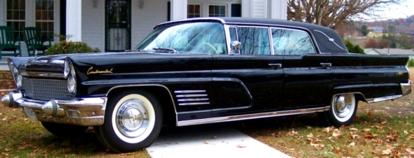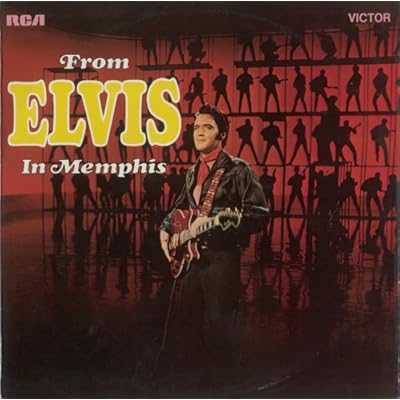 (Elvis's own Long Black Limousine, a 1960 Lincoln Mark V)
(Elvis's own Long Black Limousine, a 1960 Lincoln Mark V)One of the once common but now largely forgotten motifs of early 20th century American music is the journey to the graveyard, accompanying a family member/loved one on their "final" journey. The most famous of these songs is the Carter Family's "Can the Circle Be Unbroken," which Mark Zwonitzer (in his excellent Carter Family bio Will You Miss Me When I'm Gone) tells me was re-written by A.P. Carter from an old "mother's funeral" song, another common theme in British balladry and American folk and early popular music. It's a mourning song, but the message is one of praise to a welcoming God--a God who has brought mother close to His bosom, and will be bringing the singer home someday (soon, probably), as well.
Lord, I told the undertaker,
"Undertaker, please drive slow;
For this body you are hauling,
Lord, I hate to see her go"
Can the circle be unbroken,
By and by, Lord, bye and bye?
There's a better home a-waiting
In the sky, Lord, in the sky.
("Can the Circle be Unbroken")
(Of course, despite having been their biggest hit in one of their biggest years--1935--it is most widely known nowadays as the title track from the Nitty Gritty Dirt Band's 1972 album of the same name.)
Similar songs by possibly even more significant (if musically transitional) artists--Hank Williams and Elvis Presley--look, alternatively, backwards and forwards on the ballad tradition. Hank's "Six More Miles (To the Graveyard)," his own composition, followed the storyline of the graveyard trail as directly as the Carters', but the lyrics themselves are just a shadow of A.P.'s. The narrator has lost his "darling," but other than hearing the train a 'coming to carry her home, we don't get much insight into what he's going through. The song isn't, despite its title and chorus, really about the journey. It's about Hank's tenor, and the steel guitar, and the way that Hank was moving the country music tradition forward with his songwriting--deeply personal stories of love lost and vulnerability, the sort that men of an earlier moment did not sing. Notably, this song is about the loss of a lover, rather than a mother, and evokes God and religion only obliquely. It is a song exclusively about the narrator's loss, with only the faintest hint of a better home a 'waitin. Like most of Hank's best work, the loss he feels is unmitigated by the hope of salvation.
Elvis's "Long Black Limousine" started as a second-tier single on Crest Records out of Hollywood, CA--best known as an early home of pre-Rhinestone Cowboy (or even pre-Beach Boys!) Glen Campbell. It was written and performed by Vern Stovall (and Bobby George, about whom I can find absolutely nothing), who had a couple songs placed with Hank Snow and Ray Price. Eventually, Wynn Stewart picked up "Long Black Limousine," inching it stylistically towards where Elvis would end up in '68 by making it a little less archetypically honky tonkin' and making it swing in that Bakersfield way. From there it showed up on Merle Haggard's Branded Man, with a spoken-word interlude in place of a sung verse. All great songs, but none particularly revelatory in light of the Carter Family/Hank tradition.

Elvis's version, naturally, is a cosmic kick to the skull.
It's not just the Chips Moman production, with the fabulous but subtle backing vocals, or the American Studios session hands, some of whom had just played on Dusty in Memphis. The man had Dan Penn on guitar, for god's sake! More than anything else, it's the eeriness of listening to Elvis sing a song to an imaginary dead ex-lover--a song that sounds as if it was written for the sole purpose of being sung by some girl Elvis had bragged to about how he'd be a star (back in the Lauderdale Courts public housing development where he spent his teenage years) as she watched his funeral procession.
There's a long line of mourners, winding down through our city
Their fancy cars are such a sight to see
They must be your rich friends that knew you in the city
And now they've finally brought you back home to me
...
You said the day you left me that you would be returning
In a fancy car, for all the town to see
Well now you've finally come back, yes you've finally got your dream
Now you're riding in that long black limousine
("Long Black Limousine")
Listening to "Long Black Limousine," I can't separate Elvis the performer from Elvis the man--just another hick kid who talked big and went to the big city, but after all the high living, the traveling, the fame, and the women, ended up back where he started, having let so many down. The Memphis '68 special and the subsequent album was the last time Elvis would rise above self-parody as an artist, and this was the last great song he ever recorded.
(None of this takes into account the recently uncovered Flying Burrito Brothers live version from '69, which soulds like it's rooted in Merle's take. Since this is so widely available elsewhere, y'all can find it elsewhere.)
The Carter Family - Can the Circle Be Unbroken
Hank Williams - Six More Miles (To the Graveyard)
Vern Stovall - Long Black Limousine
Wynn Stewart - Long Black Limousine
Merle Haggard - Long Black Limousine
Elvis Presley - Long Black Limousine
Lord, I told the undertaker,
"Undertaker, please drive slow;
For this body you are hauling,
Lord, I hate to see her go"
Can the circle be unbroken,
By and by, Lord, bye and bye?
There's a better home a-waiting
In the sky, Lord, in the sky.
("Can the Circle be Unbroken")
(Of course, despite having been their biggest hit in one of their biggest years--1935--it is most widely known nowadays as the title track from the Nitty Gritty Dirt Band's 1972 album of the same name.)
Similar songs by possibly even more significant (if musically transitional) artists--Hank Williams and Elvis Presley--look, alternatively, backwards and forwards on the ballad tradition. Hank's "Six More Miles (To the Graveyard)," his own composition, followed the storyline of the graveyard trail as directly as the Carters', but the lyrics themselves are just a shadow of A.P.'s. The narrator has lost his "darling," but other than hearing the train a 'coming to carry her home, we don't get much insight into what he's going through. The song isn't, despite its title and chorus, really about the journey. It's about Hank's tenor, and the steel guitar, and the way that Hank was moving the country music tradition forward with his songwriting--deeply personal stories of love lost and vulnerability, the sort that men of an earlier moment did not sing. Notably, this song is about the loss of a lover, rather than a mother, and evokes God and religion only obliquely. It is a song exclusively about the narrator's loss, with only the faintest hint of a better home a 'waitin. Like most of Hank's best work, the loss he feels is unmitigated by the hope of salvation.
Elvis's "Long Black Limousine" started as a second-tier single on Crest Records out of Hollywood, CA--best known as an early home of pre-Rhinestone Cowboy (or even pre-Beach Boys!) Glen Campbell. It was written and performed by Vern Stovall (and Bobby George, about whom I can find absolutely nothing), who had a couple songs placed with Hank Snow and Ray Price. Eventually, Wynn Stewart picked up "Long Black Limousine," inching it stylistically towards where Elvis would end up in '68 by making it a little less archetypically honky tonkin' and making it swing in that Bakersfield way. From there it showed up on Merle Haggard's Branded Man, with a spoken-word interlude in place of a sung verse. All great songs, but none particularly revelatory in light of the Carter Family/Hank tradition.

Elvis's version, naturally, is a cosmic kick to the skull.
It's not just the Chips Moman production, with the fabulous but subtle backing vocals, or the American Studios session hands, some of whom had just played on Dusty in Memphis. The man had Dan Penn on guitar, for god's sake! More than anything else, it's the eeriness of listening to Elvis sing a song to an imaginary dead ex-lover--a song that sounds as if it was written for the sole purpose of being sung by some girl Elvis had bragged to about how he'd be a star (back in the Lauderdale Courts public housing development where he spent his teenage years) as she watched his funeral procession.
There's a long line of mourners, winding down through our city
Their fancy cars are such a sight to see
They must be your rich friends that knew you in the city
And now they've finally brought you back home to me
...
You said the day you left me that you would be returning
In a fancy car, for all the town to see
Well now you've finally come back, yes you've finally got your dream
Now you're riding in that long black limousine
("Long Black Limousine")
Listening to "Long Black Limousine," I can't separate Elvis the performer from Elvis the man--just another hick kid who talked big and went to the big city, but after all the high living, the traveling, the fame, and the women, ended up back where he started, having let so many down. The Memphis '68 special and the subsequent album was the last time Elvis would rise above self-parody as an artist, and this was the last great song he ever recorded.
(None of this takes into account the recently uncovered Flying Burrito Brothers live version from '69, which soulds like it's rooted in Merle's take. Since this is so widely available elsewhere, y'all can find it elsewhere.)
The Carter Family - Can the Circle Be Unbroken
Hank Williams - Six More Miles (To the Graveyard)
Vern Stovall - Long Black Limousine
Wynn Stewart - Long Black Limousine
Merle Haggard - Long Black Limousine
Elvis Presley - Long Black Limousine
Posted by Brandon





1 comment:
just found your blog. it is so good. thean you.
Post a Comment